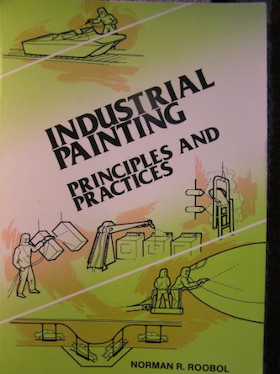
-----
Finishing of control panels: Q&A's re. epoxy, powder coating, recoatable enamel
Q. Hi,
I would like to know the various Testing Methods for testing Epoxy Paint, its hardness, its chemical & water resistance, Impact test & the best method of application of Epoxy Paint. Here I mean right from pretreatment to primer coat to finish coat. What should be the ideal coating thickness for general resistance to conditions in India, the application is on Transformer Tanks & on Control Panel Cabinets open to moisture.
Thanks,

Atul Bhide
jobshop / applicator - Mumbai, India
2003
A. You can get all the answers in the ISI standards, or ASTM standards. There are reputed labs who do this testing on commercial basis and give you the results.
However, it is tough to say the appropriate thickness for Indian conditions as there are so many factors into play.
Regards,
manufacturers of metal pretreatment chemicals - Bombay, Maharashtra, India
2003

on eBay or Amazon
or AbeBooks
(affil link)
A. Hi cousin Atul. Each of those questions is excellent, but in truth even a 5-day course might not answer them all. If there is urgency to these questions, I think your company might retain an epoxy painting consultant who could tie it all together for you in a day or two, leaving you with a process specification and testing regimen. Otherwise each is the subject of one or more threads on this site.
Will the epoxy be applied as 2-k wet paints, or as a powder coating? This will impact the answer to "ideal coating thickness". Best of luck.
Regards,

Ted Mooney, P.E.
Striving to live Aloha
finishing.com - Pine Beach, New Jersey
Ted is available for instant help
or longer-term assistance.
Powder coating peels off of control panels
Q. I work in a control panel (Material = M.S.) manufacturing plant. Generally we do powder coating to it, which makes a layer on it -- and if it is scratched it takes out the whole layer around it. But we have heard that there is some process by which it can be prevented; that is, it is sprayed a little and heated -- due to which, the coating material required is also less and no layer is formed. Can you help me?
Thank you.
- Pune, Maharashtra, India
2005
A. If the paint is coming off in sheets if it gets scratched, you could have a pretreatment or under-cure problem. I'm thinking under-cure since someone told you to try heating the parts before painting them. The information they gave you is sort of correct: if you paint a hot part the paint starts to gel as you are applying it, but it can become difficult to tell when to stop painting. That doesn't mean you are applying a thinner coat of paint, it just means that you have to apply it very quickly and be careful not to overpaint. If under-cure is really the problem, I would suggest running a tracker through you're oven and find out why it isn't curing the parts properly. If this doesn't have anything to do with what you are asking, I take it all back.

Sheldon Taylor
supply chain electronics
Wake Forest, North Carolina
2005
Can powder coating and recoatable enamel be the same thing?
Q. Hi,
I'm working on a proposal to build an electromechanical assembly. The assembly is housed in a NEMA 4 electrical enclosure. The paint specification for the enclosure states "ANSI 61 Grey, baked recoatable enamel". It's my understanding that standard electrical enclosures are powdercoated. When I think of an enamel, I think of the coating on a bathtub. Based on my own web searches I found that the term "enamel paint" can mean just about anything. To make the issue more complicated my company does have an epoxy paint standard that we do use on some control panels. Still, I couldn't find any link on the web between epoxy and enamel, but there does seem to be some references out there between powdercoating and enamel.
Am I safe using the standard powdercoat finish and just saying it meets the requirements of "ANSI 61 Grey, baked recoatable enamel"?
Thanks,
Mike
Electrical shop supervisor - Mississauga, Ontario, Canada
July 15, 2009
A. Don't worry about the descriptions we use in coatings ... powder coating, electrodeposition, electrostatic wet spray, spray gun applied, dipping, brushing ... the list goes on and on. They tend to describe the method or carrier that is used to transport the base resin from the container to the object to be coated surface, i.e., air, electrics, solvents or water. What you should be aware of is the resin system being used to make that coating. For your industry you are correct: powder coating is now the norm. Polyester for external work, epoxy for chemical environments. If the items are destined for internal locations with no atmospheric problems then epoxy polyester should be adequate.
Terry HicklingBirmingham, United Kingdom
July 20, 2009
Latest trends in control panel finishes?
Q. What is the latest trend in giving a surface finish for a control panel made out of CRCA sheet metal? Example: powder coat, liquid spray, etc.
Ravi prakashELECTRICAL ENGINEER MANUFACTURING ELECTRICAL CONTROL PANELS - Bangalore, KARNATAKA, India
December 16, 2014
A. Hi Ravi. Powder coating is already widely used on control panels and similar surfaces, and I think the very general answer is that powder coating continues to increase in popularity. The ideal finish, if affordable, is probably zinc phosphate pretreatment, followed by electrophoretic priming, followed by powder coating. Good luck.
Regards,

Ted Mooney, P.E.
Striving to live Aloha
finishing.com - Pine Beach, New Jersey
Ted is available for instant help
or longer-term assistance.
December 2014
Q, A, or Comment on THIS thread -or- Start a NEW Thread